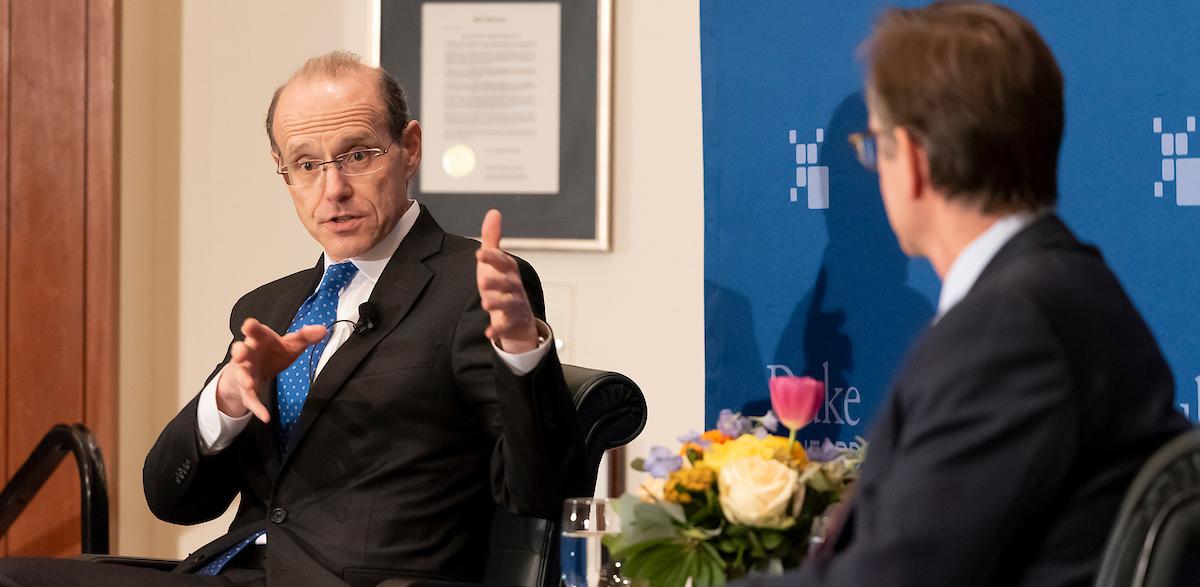In his 20s, journalist Jason DeParle wanted to understand poverty better, not through statistics, but as a lived experience. He went to the Philippines and moved in with a family in one of the worst slums in Manila.
For eight months, DeParle spent time living with Tita Portagana Comodas and her five children. The story of poverty he found there was also a story of migration, as Tita’s husband, Emet, was working as a pool cleaner in Saudi Arabia to support them.
A New York Times reporter and a two-time finalist for the Pulitzer Prize, DeParle told parts of that story as the Crown Lecturer in Ethics in a discussion with Sanford Professor Philip Bennett on Monday.
Many members of Comodas’ family worked abroad, he said. Of her 10 siblings, nine worked overseas and all five of her children did the same. It was a way out of poverty that the Philippine government encouraged, with government agencies that train and market workers abroad. Money these workers sent back home was 10 percent of Philippine economy, DeParle said.
There are 258 million migrants in the world. Globally, the money sent home by workers abroad, known as remittances, is equal to three times all of the foreign aid combined.
“It’s the world’s anti-poverty program,” he said.
The Comodas family and DeParle became good friends and kept in touch after he left Manila. “They were great letter writers,” he said.
Turning a Friendship Into a Book
Decades later, DeParle decided to write a book about the family as a way of examining the issues of migration. In “A Good Provider is One Who Leaves: One Family and Migration in the 21st Century” he focuses on the quiet middle daughter, Rosalie, as the central character.
“She had a faith and a resilience that made itself known slowly,” DeParle said.
In the 1970s and ‘80s, Philippine migrant workers tended to be men who worked in construction in the Middle East. In the 1990s, worker demand shifted to retail and caretaker jobs, which were filled by women. Rosalie fit this pattern. She became a nurse and worked in Abu Dhabi, while her husband and children remained in the Philippines. Later, Rosalie moved to Houston and was able to bring her family there and buy a house.
“Rosalie’s life was never her own,” DeParle said. ”Her sacrifice gained money for her family, but her last daughter was raised by her sister.”
But Rosalie’s sacrifice was “a triple win: it was good for her, good for her family here, and for her family in the Philippines, it was a miracle” that lifted them out of poverty.
Focus on Migration
DeParle was working on the book during the 2016 election. “The whole lens changed, and the national narrative turned against immigration, but at the local level, it is still welcoming,” he said.
Historically, immigration was not a partisan issue; there was support from both sides, he said. During the Cold War, the U.S. welcomed refugees as part of its foreign policy.
Attitudes and policy shifted after the turn of the century, as more immigrants moved into the South and responses to 9/11 sparked anxiety about immigrants.

DeParle hopes an international policy about migrant workers will evolve, similar to international trade policies. Poor people need jobs and rich countries with aging populations need workers. It’s not just low-skilled workers. DeParle pointed out that in the Arab Emirates, 95 percent of the labor force is foreign workers, including most college professors.
“There should be an accepted international process to govern movement of temporary labor,” he said.
How immigrants assimilate into America has also shifted over the years. At the beginning of the 20th century, the key to success for immigrants was to quickly become as American as possible, to speak English and to fit in.
Now, keeping some of the behaviors from the original culture can be a path to success. Rosalie’s daughter Laura was, religious and well-behaved in school, and became a star pupil in Houston.
“It’s good for your country to be the place where people go for dreams to come true,” DeParle said.
The Crown Lecture in Ethics brings speakers to Duke to explore ethical issues across all disciplines. Previous Crown lecturers include Nobel Peace Prize-winner and Yazidi refugee Nadia Murad, Rwandan humanitarian Paul Rusesabagina, playwright Tony Kushner and science writer Rebecca Skloot.
Featured Audio
Policy 360: A Good Provider is One Who Leaves
While on campus, Jason DeParle spoke with Dean Judith Kelley for the Policy 360 podcast.
